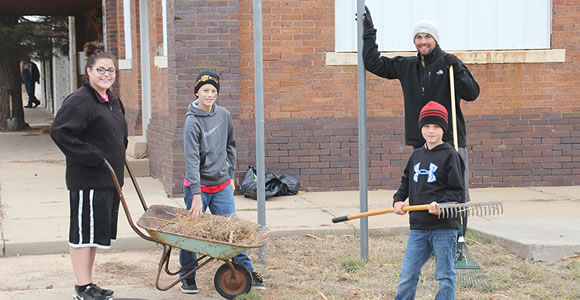A Clarendon woman was found guilty of intoxicated manslaughter last week in the 2014 death of C.W. “Dude” Cornell.
Gina Gail Cannon was sentenced to 12 years in prison by a Childress County Jury, which returned its unanimous verdict after a four-day trail, ending Thursday, October 22.
Cannon, 35, was arrested for the offense that took place in Clarendon on June 28, 2014 and was indicted by a Donley County Grand Jury on November 13, 2014 and again on August 12, 2015.
District Attorney Luke Inman prosecuted the case for the State of Texas with the Honorable Judge Stuart Messer presiding.
“This was not the typical intoxication manslaughter case which presented some major obstacles and hurdles that we had to maneuver and get over,” Inman said. “Dude passed away nine days after the crash and although he was 86 years old, he was in great health and still very involved in the Clarendon community he had called home for so long.”
According to testimony from Dr. Sridhar Natarajan, the Chief Medical Examiner for Lubbock County, Cornell’s death was caused from medical illness due to complications from a multi-vehicular crash caused by Cannon.
Natarajan testified as a reviewing medical examiner from the original autopsy. Natarajan’s testimony concluded the State’s case on Wednesday.
After the jury was seated on Monday, the State started testimony on Tuesday with DPS Trooper Kelly Hill. Hill is also a volunteer firefighter in Donley County and was on the scene just minutes after the crash, according to his testimony.
Hill detected the odor of alcohol when he made contact with Cannon, who was the driver of a red Chrysler 200 that witnesses saw crash into and launch Cornell’s vehicle more than 300 feet across oncoming traffic on US Highway 287.
Zan and Robert Bullock also testified for the State, and saw Cannon driving erratically through town and on Highway 287 just moments before the crash. Other eyewitness testified to the reckless and careless driving of Cannon, including Clarendon local Madeline Black, Hedley resident Jennifer Floyd, and Sheila Wheeler from Henrietta.
Ruth Hancock, also of Clarendon, was in the vehicle with Cornell when it was struck by Cannon’s vehicle. Hancock testified that Cornell told her right after the crash that there was nothing that he could have done.
Before ending Tuesday afternoon’s testimony, Deanna Cornell testified for the state regarding Cornell’s condition over the last nine days of his life after the crash that left him paralyzed.
Wednesday’s testimony began with Medical Technologist Jenny Marquez’s testimony from Northwest Texas Hospital, regarding the urine analysis and blood draw from Cannon at the hospital.
The State elicited testimony that the alcohol concentration, as well as the benzodiazepines and cannabinoids, in Cannon’s system impaired her ability to operate the Chrysler that evening, according to Jim Blundell’s expert testimony.
The defense called its own expert, Dr. Robert Philips of Howardwick, to controvert Natarajan’s testimony, although Philips never provided care to Cornell before or after the crash.
In closing, defense attorney Mike Warner argued that Cannon had violated the rules of the road by being intoxicated but that Cornell also had to bear some responsibility for the accident for being in the passing lane and not wearing his seatbelt. He also said, considering life expectancy rates, Cornell, at 86, had “had a good run.”
Inman rebutted the defense’s closing statement.
“Dude is not with his family for one reason – the selfish acts of the defendant,” the district attorney said.
The jury of seven women and five men deliberated for approximately 15 minutes before reaching a verdict of guilty on Thursday morning.
The punishment phase ensued where Cornell’s son, Bill, gave an emotional testimony regarding his father’s character and his role in the community. He also said his father’s mother lived to the age of 96 and the family had no reason to expect that Dude wouldn’t live another ten years.
“He was well respected. He was a good father and always there for us,” Bill Cornell said. “He worked long hours and taught us how to work. He was generous and kind.”
Cannon’s sister, Renee, also took the stand and testified about the defendant’s family life and the medical problems she has had since the accident.
After deliberation, the jury returned with the sentence of 12 years and also determined that Cannon should pay a $10,000 fine.
“I thank our jury and our family’s cooperation throughout this jury trial and entire judicial process because both mean so much to us,” said Inman. “I want to take this opportunity to say a special thank you to my entire staff who poured out extra blood, sweat, and tears on this case. They know who they are and they don’t get enough credit. With a smaller jurisdiction like ours, all of us wear many different hats and this case made all of us go the extra mile and it was well worth it.”








Reader Comments